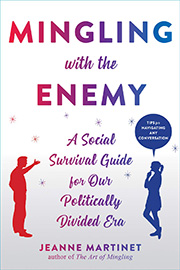
The Third Rail
Posted on September 13, 2012
Like most single people, I socialize a lot with couples. Most of my friends are in couples. Sometimes we go to the theater or a movie, but often it’s just good conversation over dinner. What I have learned is that the potential problem inherent in single-to-couple socializing is not the uneven number of people, nor is it being the only single person there; it’s being the single person in a threesome. Almost every single person you talk to will tell you that being a fifth wheel (or better yet, a seventh or ninth wheel) is infinitely better than being a third wheel. Three is a tricky number.
The terms “fifth wheel” and “third wheel” come from the fact that four-wheeled carriages used to carry an extra wheel (or that two-wheeled carts might carry a third). Obviously the spare wheel was not necessary to make the conveyance go. Ergo, it connotes something that serves no useful purpose.
However, the truth is that being a third wheel is not as much about being unnecessary or unwanted as it is about causing instability. A shopping cart with only three wheels can be wonky or lopsided, just as threesomes in social life are potentially unwieldy. Three friends together is always more complicated than two or four. With three people, the psychological balance is always shifting—however slightly—between one pair and another.
Unfortunately, the older I get, the more I seem to be going out with only one couple at a time. These can make for lovely, intimate evenings, except when something like this happens:
Let’s say I am in the middle of dinner with Jennifer and Rick. We are talking about modern technology and its effect on the human brain. Everything is going along quite nicely, until Jennifer suddenly says, “Hey, listen. You can help Rick and me solve a dispute we are having.” (Right here is where, if there were alarms hooked up to our social lives, the flashing lights and bells would go off.)
Jennifer continues: “I feel our daughter should not have a cell phone until she is 14, but many of her friends have them now, at age 11, and Rick thinks she needs one, especially being in New York City. What do you think? Will you please tell Rick he’s out of his mind?” Uh-oh. Trouble. Trouble in the shape of a big, fat triangle.
Triangulation is the process whereby a person who has an issue with someone else uses a third person to validate her feelings. This is more commonly known as Getting Sucked Into a Fight. In extreme situations, triangulation can make you feel as if you are trapped in a scene from Who’s Afraid of Virginia Woolf?
But it doesn’t always manifest as an actual argument; it can be more passive than that, such as when a husband flirts with you in front of his wife or a wife makes cutting remarks about her husband in front of you. Sometimes it’s the third wheel herself who is responsible for pushing the evening onto the third rail. She can inadvertently reveal a secret one person has told her to “put in the vault.” Or she can bring up sore subjects or show markedly more interest in one person’s anecdotes than the other’s.
But one thing is certain: When you are asked point blank to side with one person against the other, no good can come of it. At the first sign of this kind of triangulation, you should proceed with extreme caution. Change the subject or, if you can, leave the table to go to the restroom, feed the meter or make a call.
If you are not able to sidestep the landmine, pretend to mediate. Listen carefully to both sides, then claim you are unable to decide on the matter. Other triangulation diffusers? Try “Don’t ask me—I’m the proverbial disinterested third party” or “I refuse to answer on the grounds that it may incriminate me.” Or even “Look they have marriage counselors for this!”
To the Jennifer/Rick debate above, I might smile and say, “I make enough bad decisions about my own life. Please don’t ask me to make bad decisions for yours.”
Blog Categories
